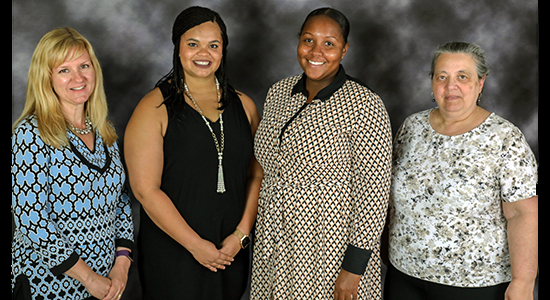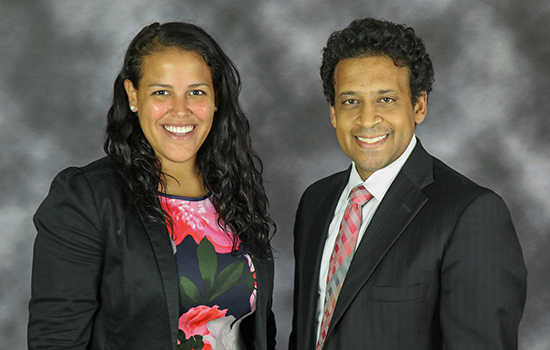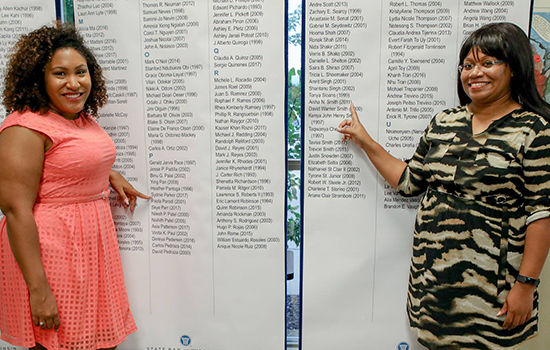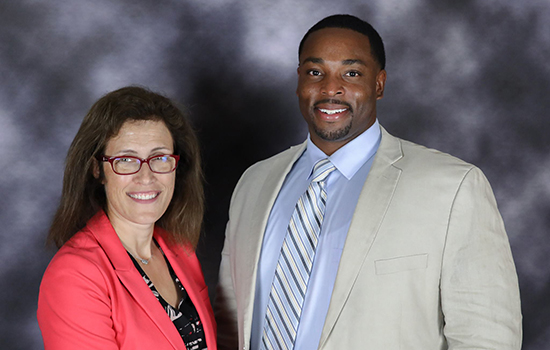The State Bar celebrated 25 years of the Diversity Clerkship Program with a reception for participating employers and law student clerks. Visit our Facebook page for more photos of this event, or click here.
Aug. 2, 2017 – Boardman & Clark LLP in Madison has long made a point of hiring first-year law students as clerks in the summer.
It’s a very successful strategy for attracting good young attorneys to the firm, says Anita Gallucci, a partner and chair of the firm’s recruiting committee.
Gallucci was a young associate in 1993 and in charge of the firm’s clerk program when she heard of a new State Bar of Wisconsin program that placed law students of minority and diverse backgrounds in clerkships for their 1L summer.
“The partners thought it would be a good way for the firm to support minority law students, as well as to help diversify the workplace here,” she said.
Celebrating its 25th year, the State Bar’s Diversity Clerkship Program is a limited-term, summer employment experience that gives first-year law students with diverse backgrounds the opportunity to build legal practice skills and knowledge. Participating employers provide a paid, 10-week summer clerkship opportunity for a first-year law student with a diverse background.
The program, launched in the summer of 1993, was the work of the Committee to Encourage Placement of Minority Lawyers, formed in 1992 by then-State Bar President Daniel Hildebrand. The first summer, 10 clerks were placed with eight employers, including Boardman, Suhr, Curry, & Field – as the firm was known then. The list of employers also includes Northwestern Mutual Life Insurance in Milwaukee – which also has participated in the program since its inception.

Boardman & Clark this year celebrates 25 years' participation in the Diversity Clerkship Program. Pictured: Law clerk Victoria Crosby, second from left, with Boardman & Clark lawyers, from left: Jennifer Mirus, Ashley Rouse, and Anita Gallucci.
Visit the State Bar's Facebook page for more photos of this event, or click here.
A Quarter Century
After a quarter century, Boardman & Clark remains active in the program.
“We maintain a commitment to the program not only because it supports diverse law students and benefits our firm, but also because we are committed to supporting the State Bar and improving the practice of law within Wisconsin,” Gallucci said.
“As long as there is a program, we’ll participate,” she said.
The attorneys at Boardman & Clark highly value the Diversity Clerkship Program. “We see really great candidates. I believe the quality of the candidates over the years has only increased,” she said. “That has also been a strong incentive to stay in the program.”
In fact, the firm has helped the program to grow – with the participation of the Madison City Attorney’s Office. The city attorney, Michael May, worked as a partner at Boardman, Suhr, Curry, & Field for many years. “It was because of his experience here that he encouraged the city to participate in the program,” Gallucci said.

“I cannot wait to see how the skills and knowledge I’ve learned transfer to the classroom and beyond.” – Yamilett Lopez, clerk with Northwestern Mutual
Pictured: Law clerk Yamilett Lopez with Wesley Warren of Northwestern Mutual Life Insurance Company. Visit the State Bar's Facebook page for more photos of this event, or click here.
The Program: 453 Students, 74 Employers
The Diversity Clerkship Program is still needed, according to Michelle Behnke, former State Bar president who was involved in the committees that organized and operated the program in the 1990s. The program is now operated by the State Bar’s Diversity and Inclusion Oversight Committee.
Shannon Green is communications writer for the State Bar of Wisconsin, Madison. She can be reached by email or by phone at (608) 250-6135.
Over the past 25 years, the program has placed 453 law students with 74 law firms, corporations, and government offices.
Programs like the State Bar’s began at a time when bar leaders nationwide recognized that lawyers of diverse backgrounds were struggling to work in practice areas outside of government agencies, said Behnke, who spoke recently at a reception for the 2017 law clerks and their employers.
In Wisconsin, lawyers involved in State Bar leadership like Michael Gonring and Earl Munson Jr. laid the groundwork for the program and got it running, recognizing at the time that Wisconsin’s legal profession was not very diverse.
Munson noted in 1993 that only three of 100 minority law graduates went to work for medium and large firms. “Most minority law graduates leave the state, and those who remain in Wisconsin go disproportionately into the public sector or solo practices,” he said in the June 1993 Newsletter of the State Bar of Wisconsin.
They looked to the model set by the American Bar Association.
“The goal of the program was simple – place a diverse group of first-year law students in summer internships with private law firms for a summer clerkship experience,” Behnke said. “The law students would be exposed to private practice and a variety of practice areas. The law firms would gain legal support and could participate in the program as a tool to address their own diversity goals.”

“This was a great experience. I’ve been exposed to a variety of legal fields and worked on a range of projects with different attorneys.” – Sydnie Parker, clerk with Great Lakes Higher Education Corp.
Pictured: From left, law student Sydnie Parker and Aisha Smith of the Great Lakes Higher Education Corp, who participated as a student in the program in 2011. Visit the State Bar's Facebook page for more photos of this event, or click here.
Addressing Racial and Ethnic Barriers
Recent studies show only small improvements in diversifying the profession since then, Behnke noted, with the ABA reporting in 2013 that African-American and Hispanic lawyers comprise only 8.4 percent of the legal profession, while comprising 25 percent of the U.S. workforce.
“There is still reason to be optimistic,” Behnke said. State bars, the ABA, and other associations across the country, along with many corporations, are committed to boosting diversity in the workforce.
She fully expects the program to celebrate its 50th year. By 2042, she said, the U.S. will be a “majority minority” country, with no one race or ethnicity in the majority. These demographic changes make the need for such programs more urgent, says Behnke.
“We must never stop trying to include those that are on the outside or not fully included in the legal profession,” she said.

“I’ve had the opportunity to see what it is like not only to be a lawyer, but a business person as well.” – Torrean Edwards, clerk with GE Healthcare
Pictured: Heidi Ratzlaff of GE Healthcare with law clerk Torrean Edwards. Visit the State Bar's Facebook page for more photos of this event, or click here.
Plans and Takeaways
Meanwhile, the 2017 clerks are using the experience to better plan their future careers – for some, in areas that they never thought to explore, and for others, the experience reinforced their interest in an area of law.
“My Diversity Clerkship Program experience was phenomenal!” This is the response from law student Chue Xiong, one of 16 law students matched with employers as summer law clerks through the State Bar of Wisconsin Diversity Clerkship Program. Xiong was matched this summer with American Family Insurance.
Ricardo Tapia participated in every facet of litigation, including pretrial negotiations and first-hand work on a jury trial as a law clerk for Society Insurance. Kierre Elvington clerked with Church Mutual Insurance Co., which gave him a glimpse into corporate, litigation, and regulatory practice areas.
A real benefit, Elvington said, was “working alongside a legal team with decades of practical legal experience and sound business acumen – something you cannot replicate in a classroom setting.”
Hannah Demsien, who worked with Madison City Attorney Michael May, said her experience has confirmed her interest to work in government law. She was surprised to learn the degree to which municipal law affects people’s everyday lives. “I've learned a lot about how municipal law interacts with state and federal law and about how to research municipal law.”
Visit the State Bar's Facebook page for more photos of this event, or click here.
Employers Needed for 2018 Summer Diversity Clerkship Program
Employers – law firms, corporate legal departments, and government agencies – are needed for the 2018 Diversity Clerkship Program.
The State Bar’s Diversity Clerkship Program is a limited-term, summer employment experience that gives first-year law students with diverse backgrounds the opportunity to build legal practice skills and knowledge. Participating employers provide a paid, 10-week summer clerkship opportunity for a first-year law student with a diverse background.
Employers can enroll through Jan. 12, 2018. Learn more about the program, or contact Megan Zurbriggen at (800) 444-9404, ext. 6181.
